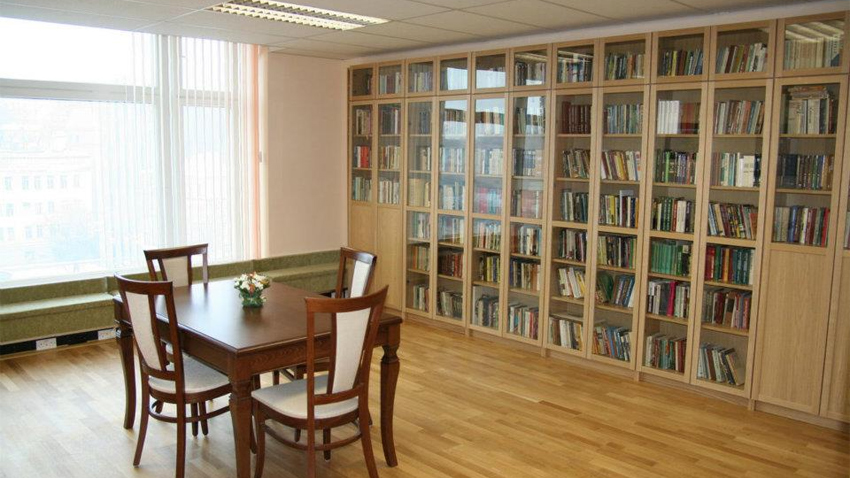For thirty years now, the Bulgarian Culture Institute (BCI) in Moscow has been carrying out its mission for promoting the Bulgarian cultural achievements in Russia. The institute was founded in 1988 when on 19 January the government of the two countries signed a special agreement. Since 2011, the center has been operating on the premises of M. I. Rudomino All-Russian State Library for Foreign Literature.

“The tradition of cultural ties is the most productive line for the development of bilateral relations between Bulgaria and Russia”, claims the Director of the Bulgarian Cultural Institute Pavel Vasev. This year when the two countries mark the 140th anniversary since the Russo-Turkish War of Liberation a program of events will be held in Moscow with Bulgarian participation.
“We can leave a good impression and promote the positions of Bulgarian culture not only with the cream of cultural achievement”, Pavel Vasev explains. “Therefore at the start of my term of office our team laid an emphasis on Bulgaria’s national cultural institutions and of course on other things too. In the course of two years – together with Academician Plamen Kartalov, we worked for a guest appearance of the Sofia Opera House with The Ring of the Nibelungby Richard Wagner and with two ballet shows scheduled for the time slot from 12 to 24 May. Of course, there are other events that have been the focus of a few years of work. Recently, we received in Moscow the Director of Bulgaria’s National History Museum, Assoc. Prof. Dr. Boni Petrunova. The museum is about to sign an agreement with Tretyakov Gallery and from 6 July till end-September the gallery is expected to put on display exceptional samples of the Bulgarian school of icon-painting – icons from 14th to 16th centuries.”
Speaking about events that BCI is going to accentuate in 2018, Pavel Vasev also highlighted the film program that Bulgaria’s National Film Center and Mosfilm have been preparing for the 140th anniversary of the end of the Russo-Turkish War that resulted in the liberation of Bulgaria. Screenings will be hosted by the Tretyakov Gallery at the beginning of March.
“Films on show will include Time of Violence, Heroes of Shipka, /a Russian-Bulgarian production/ and Julia Vrevskaya directed by Nikola Korabov. Korabov was trained by representatives of the Russian school of theater and we found in their film archives a very good copy of his film Freedom or Death dedicated to the self-sacrifice of Hristo Botev. This film has not been screened in Bulgaria but was distributed in Russia and there are a few copies of it with good quality dubbed in Russian.”
“I must mention a very good exhibition of the State Historical Museum of Russia with the participation of the Pleven Museum of Military History with about 70 items on display. It is important to say that last year – after an absence of 10-15 years from the Moscow Book Fair we presented a few Bulgarian publishing houses. Our display was entitled O Pismenyah (Of Letters) and it aimed to defend the Bulgarian origin of the Cyrillic and Glagolitic alphabets showing the literary activity of Bulgarian monasteries and churches.”

Contemporary Bulgarian literature has also been trying to reach more Russian readers. Over the past four years BCI in Moscow has supported the publishing of two or three Bulgarian novels translated to Russian.
“The latest tittles that we count on are Viktor Paskov’s A Ballad for Georg Henig, and Thrown into Nature and Toddler Murders by Milen Ruskov. They will be released in mid-2018”, said Pavel Vasev and added that one major difficulty is the lack of translators.
Otherwise, there is interest in the Bulgarian language in Russia – it is a fact that the major Bulgarian Philology is studied in several universities. The Bulgarian Cultural Center also organizes Bulgarian language courses:
"They are a very good tradition. Annually, about 120-130 trainees complete these courses and receive the respective certificates for different levels of language proficiency. Bulgarian language trainees have different backgrounds. Often these are people who own properties in Bulgaria and have decided to make a lasting contact with this country – I know a few such people. There are others who have scholarly interests and occupations or have family in Bulgaria and are motivated to learn the language”, concludes the Director of the Bulgarian Cultural Institute in Moscow Pavel Vasev.
English Daniela Konstantinova
Photos: Bulgarian Culture InstituteOn 25 January 2025, the Bulgarian National Radio will celebrate its 90th anniversary . The public broadcaster is organising a series of events to mark the occasion. A special programme today presents a multimedia project - a virtual exhibition,..
"Hello, my name is Marin Marinov, I am an artist and I am currently an assistant professor of fine art painting under Professor Kiril Bozhkov at the National Academy of Arts in Sofia. This is the starting point of a kaleidoscopic story that will take us,..
When was the last time you went to a live music venue? Did you notice the faces of the people there? They were different, weren't they? - This is what the exhibition "Sofia's Faces by Night" will try to show us when it opens on January 16 in the heart of..
Just a few weeks after being proclaimed Writer of 2024 at the annual Sofia City Library awards and after her Nishka (Thread) was declared novel of the..

+359 2 9336 661
